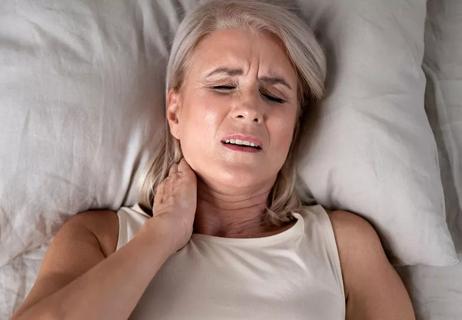Stretching or applying heat and ice can provide pain relief

With so many of us gazing into computers or staring down at our smartphones most of the day, it’s no wonder we’re having neck pain. In fact, data from the Centers for Disease Control and Prevention’s 2018 National Health Interview Survey found that 16.1% of adults experienced neck pain within the past three months.
Advertisement
Cleveland Clinic is a non-profit academic medical center. Advertising on our site helps support our mission. We do not endorse non-Cleveland Clinic products or services. Policy
A stiff neck typically develops when your muscles weaken over time from poor posture or misuse, says chiropractor Andrew Bang, DC. “When your neck muscles become weak and you try to turn your head, the joint no longer moves smoothly because it’s now out of place,” Dr. Bang says. “Often the joint catches on something, either pulling a muscle or hitting the nerve irregularly, or maybe both.”
“Then you’ll have instant pain and your body has a protective spasm. Your body doesn’t want you to get hurt more, so it will clench, causing you to feel like you can’t even move — and leaving you wondering what you did to injure yourself.”
Looking down at your computer monitor all day can cause the muscles around the neck joints to tire and become overstretched. Driving for long periods of time, as well as looking at your smartphone, can have the same effect. And doing this day after day can add up and displace your neck joints.
For minor, common causes of neck pain, try these simple remedies:
Use ice for the first 48 to 72 hours, then use heat after that. Heat may be applied with warm showers, hot compresses or a heating pad. Be sure not to fall asleep with a heating pad or ice bag in place to avoid skin injuries.
Advertisement
Doctors recommend ibuprofen or acetaminophen.
However, avoid jerking or painful activities. This helps calm your symptoms and reduce inflammation.
Have a partner gently massage the sore or painful areas. When doing this, communication is key. Have your partner try a variety of techniques until they land on one that feels good.
“You’ll want them to say, ‘How does this feel? Do you want more or less pressure?’ That’s what a massage therapist will do,” says Dr. Bang. “Then keep adapting until you both find the sweet spot.”
No matter what technique you choose, however, he advises that any massage movements should be directed toward the heart. This matches the way the blood flows in your veins, the bluish-purple lines visible under your skin. Too much pressure going in the wrong direction, away from your heart, has the potential to damage a valve.
Try sleeping on a firm mattress without a pillow or with a special neck pillow.
Ask your healthcare provider about using a soft neck collar to relieve discomfort. Don’t use the collar for a long time. Doing so can make your neck muscles weaker.
The key to relief for a stiff neck is proper stretching and manipulation, Dr. Bang says. Doing slow range-of-motion exercises, up and down, side to side, and from ear to ear, can help to gently stretch the neck muscles. Certain yoga poses can also help ease stiffness.
Here are some other specific stretches you can try at your desk or in the car that may help you avoid a stiff neck:
Here are some ways to prevent neck pain that comes with a stiff neck.
Dr. Bang says if your neck is bothering you, you should pay attention to your sleep positions. Sleep only on your side or on your back – never on your stomach, he says.
“When you sleep on your stomach, often you will end up twisting your head one way or the other for hours at a time,” Dr. Bang says. “Sleeping on your stomach also can affect your low back because your belly sinks into the bed if you don’t have enough support.”
To help you avoid neck pain, put your monitor at eye level, sit up straight and avoid tilting and twisting your head down or to the side while you’re on the computer. Also, be sure to take breaks from staring at your screen.
When you’re driving or using your smartphone, be sure to take frequent breaks and avoid having your neck bent forward for long periods of time, Dr. Bang says.
Advertisement
How long neck pain lasts depends on a variety of factors. This includes what kind of injury caused the acute (or sudden) neck pain—for example, a car accident, a sports injury or a muscle pull from working outside—and how you respond to the injury.
“Many times, symptoms can resolve over a period of months if you stop doing the offending behavior,” says Dr. Bang. “Neck pain from car accidents can last a long time. But if you don’t get in another car wreck, your pain will typically go away over a few months. However, if you don’t change a habit that causes neck pain, like using a computer monitor poorly, it’s going to last.”
If pain persists and gets in the way of your daily activities, or any treatment you try doesn’t seem to be working, further discussion might be necessary. “If you tried some things on your own and after two months it’s not gone away, then it’s probably time to see your doctor to figure out if there’s an underlying issue or if there’s some behavior you need to change.”
Advertisement

Sign up for our Health Essentials emails for expert guidance on nutrition, fitness, sleep, skin care and more.
Learn more about our editorial process.
Advertisement

Looking down at your smartphone or computer screen can stress muscles in your neck, shoulders and back

7 tips for choosing the best pillow to ease neck pain

Gallstones can block bile in your biliary system and lead to pain and discomfort

This chronic condition most commonly causes pelvic pain and severe cramping during periods, but it can bring other types of pain symptoms, too

Your knees could be hurting at bedtime because of inflammation, injury or some other condition that gets worse with pressure and positioning

Spinal blocks provide complete numbing for shorter periods, while epidurals can allow for some feeling

Leg-related symptoms indicate DVT, while chest symptoms point to a pulmonary embolism

Eat foods that are high in protein and low in animal fat and simple sugar

Even small moments of time outdoors can help reduce stress, boost mood and restore a sense of calm

A correct prescription helps your eyes see clearly — but as natural changes occur, you may need stronger or different eyeglasses

Both are medical emergencies, but they are very distinct events with different causes